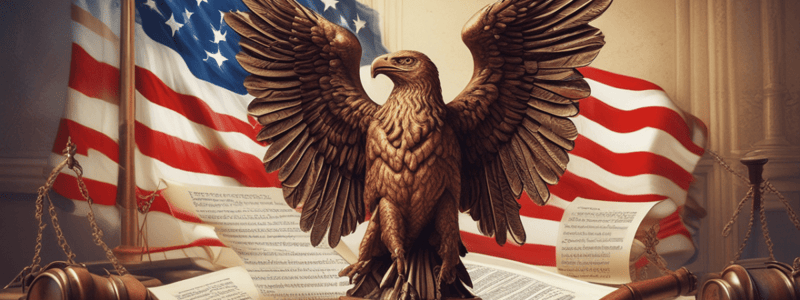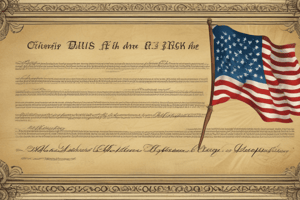Podcast
Questions and Answers
Which of the following is NOT a requirement for jury eligibility?
Which of the following is NOT a requirement for jury eligibility?
- Have no felony convictions
- Be a US Citizen
- Own property in the relevant jurisdiction (correct)
- Be 18 years of age or older
What is the purpose of a grand jury?
What is the purpose of a grand jury?
- To decide liability and damages in civil cases
- To decide whether further investigation or prosecution is warranted (correct)
- To determine guilt or innocence in criminal cases
- To select the judge presiding over a criminal case
What is the primary difference between a limited voir dire and an expansive voir dire?
What is the primary difference between a limited voir dire and an expansive voir dire?
- The eligibility requirements for serving on the jury
- The type of questions asked to potential jurors (correct)
- The decision-making power of the judge versus the attorneys
- The number of peremptory challenges allowed
Which of the following is NOT a type of jury decision mentioned in the text?
Which of the following is NOT a type of jury decision mentioned in the text?
What is the purpose of a peremptory challenge during jury selection?
What is the purpose of a peremptory challenge during jury selection?
Which of the following is a right guaranteed by the 6th Amendment?
Which of the following is a right guaranteed by the 6th Amendment?
What is the purpose of a Batson challenge during jury selection?
What is the purpose of a Batson challenge during jury selection?
What is the purpose of a bifurcated jury process in a death penalty case?
What is the purpose of a bifurcated jury process in a death penalty case?
What is the primary purpose of the voir dire process during jury selection?
What is the primary purpose of the voir dire process during jury selection?
What is the key difference between a civil jury and a criminal jury, as described in the text?
What is the key difference between a civil jury and a criminal jury, as described in the text?
What was the key ruling in the Batson case?
What was the key ruling in the Batson case?
Which of the following cases extended the Batson ruling to civil cases?
Which of the following cases extended the Batson ruling to civil cases?
In the study by Nietzel & Dillehay (1986), what was the difference in jury verdicts for death penalty cases with and without the use of trial consultants?
In the study by Nietzel & Dillehay (1986), what was the difference in jury verdicts for death penalty cases with and without the use of trial consultants?
Which case extended the Batson ruling to prohibit the exclusion of jurors based on gender?
Which case extended the Batson ruling to prohibit the exclusion of jurors based on gender?
In the Georgia v. McCollum case, what was the key ruling regarding the defendant's use of peremptory challenges?
In the Georgia v. McCollum case, what was the key ruling regarding the defendant's use of peremptory challenges?
Which of the following statements is true about the effectiveness of scientific jury selection compared to traditional jury selection?
Which of the following statements is true about the effectiveness of scientific jury selection compared to traditional jury selection?
In the Powers v. Ohio case, what was the key ruling regarding the exclusion of jurors based on race?
In the Powers v. Ohio case, what was the key ruling regarding the exclusion of jurors based on race?
What was the key issue in the J.E.B. v. Alabama ex rel. T.B. case?
What was the key issue in the J.E.B. v. Alabama ex rel. T.B. case?
What was the key issue in the Edmonson v. Leesville case?
What was the key issue in the Edmonson v. Leesville case?
Flashcards are hidden until you start studying
Study Notes
Jury Eligibility Requirements
- Not a requirement for jury eligibility: Being a homeowner.
Grand Jury Purpose
- Purpose of a grand jury: To determine if there is enough evidence to bring criminal charges against a person.
Voir Dire Differences
- Primary difference between limited and expansive voir dire: Limited voir dire uses a more constrained questioning process with fewer questions, while expansive voir dire allows for a broader range of questioning.
Types of Jury Decisions
- Not a type of jury decision: A hung jury (a jury that cannot reach a unanimous verdict) is not a type of jury decision.
Peremptory Challenge Purpose
- Purpose of a peremptory challenge: Allows lawyers to remove potential jurors without giving a reason.
Sixth Amendment Right
- Right guaranteed by the Sixth Amendment: The right to a fair and impartial jury.
Batson Challenge Purpose
- Purpose of a Batson challenge: To challenge the use of peremptory challenges to remove jurors based on race.
Bifurcated Jury Process Purpose
- Purpose of a bifurcated jury process in death penalty cases: It separates the trial into two phases: one to determine guilt or innocence and the other to decide on the sentence (including the potential for capital punishment).
Voir Dire Purpose
- Primary purpose of voir dire: To identify potential jurors who may be biased or prejudiced.
Civil vs. Criminal Jury
- Key difference between a civil jury and a criminal jury: While both types of juries make factual decisions, civil juries determine liability and damages, while criminal juries resolve the guilt or innocence of the defendant.
Batson Case Ruling
- Key ruling in the Batson case: The Supreme Court ruled that it is unconstitutional to use peremptory challenges to strike prospective jurors based on their race.
Batson Extension to Civil Cases
- Case that extended the Batson ruling to civil cases: Edmonson v. Leesville Concrete Co.
Jury Verdicts in Death Penalty Cases
- Difference in jury verdicts for death penalty cases with and without trial consultants: According to the study by Nietzel and Dillehay (1986), juries who used trial consultants were more likely to find defendants guilty.
Batson Extension to Gender
- Case that extended the Batson ruling to gender: **J.E.B. v. Alabama ex rel. T.B. **
Georgia v. McCollum
- Key ruling in Georgia v. McCollum: The Court upheld a defendant's right to use peremptory challenges to remove potential jurors, even if they are doing so based on race.
Scientific vs Traditional Jury Selection
- Truth about the effectiveness of scientific jury selection compared to traditional selection: Studies have shown that scientific jury selection is generally no more effective than traditional jury selection.
Powers v. Ohio
- Key ruling in Powers v. Ohio: The Supreme Court ruled that a criminal defendant could challenge the use of peremptory challenges based on race, even if they were not of the same race as the excluded jurors.
J.E.B. v. Alabama
- Key issue in J.E.B. v. Alabama ex rel. T.B.: The case challenged the use of peremptory challenges to remove jurors solely based on their gender.
Edmonson v. Leesville
- Key issue in Edmonson v. Leesville Concrete Co.: This case extended the ruling in Batson v. Kentucky by prohibiting the use of race-based peremptory challenges in civil cases.
Studying That Suits You
Use AI to generate personalized quizzes and flashcards to suit your learning preferences.




